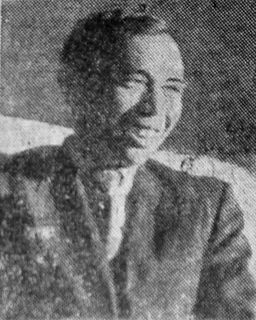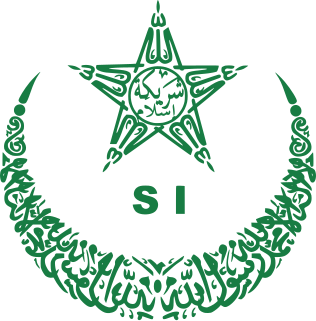Related Research Articles

The Communist Party of Indonesia was a communist party in Indonesia during the mid-20th century. It was the largest non-ruling communist party in the world before its brutal and violent eradication in 1965 and ban the following year. The party had two million members in the 1955 elections, with 16 percent of the national vote and almost 30 percent of the vote in East Java. During most of the period immediately following independence until the eradication of the PKI in 1965, it was a legal party operating openly in the country.

Semaun, also spelled Semaoen, was the first chairman of the Communist Party of Indonesia (PKI) and was a leader of the Semarang branch of the Sarekat Islam.

Sarekat Islam or Syarikat Islam was an Indonesian socio-political organization founded at the beginning of the 20th Century during the Dutch colonial era. Initially, SI served as a cooperative of Muslim Javanese batik traders to compete with the Chinese-Indonesian big traders. From there, SI rapidly evolved into a nationalist political organization that demanded self-governance against the Dutch colonial regime and gained wide popular support. SI was especially active during the 1910s and the early 1920s. By 1916, it claimed 80 branches with a total membership of around 350,000.

The Partido Komunista ng Pilipinas-1930 (PKP-1930), also known as the Philippine Communist Party, is a communist party in the Philippines that was established on November 7, 1930. It uses the aforementioned appellation in order to distinguish itself from its better known splinter group, the Communist Party of the Philippines.
The Hukbalahap Rebellion was a rebellion staged by former Hukbalahap or Hukbo ng Bayan Laban sa Hapon soldiers against the Philippine government. It started during the Japanese occupation of the Philippines in 1942 and continued during the presidency of Manuel Roxas and ended in 1954 under the presidency of Ramon Magsaysay.
Sentral Organisasi Buruh Republik Indonesia was an Indonesian trade union centre. SOBRI was founded in Bandung in 1951. SOBRI functioned as the trade union wing of the Murba Party.
Sarbupri, short for Sarekat Buruh Perkebunan Republik Indonesia, was a trade union of plantation estate workers in Indonesia. As of the late 1950s, it was the largest trade union in the country. Sarbupri was affiliated to the trade union centre SOBSI, which was linked to the Communist Party of Indonesia.
Sarekat Buruh Kehutanan Islam was a trade union of forest workers in Indonesia. SBKI was founded in 1965. SBKI, formed by Islamic foresters, sought to counter the influence of the communist-aligned Sarbuksi union. SBKI was affiliated with the Islamic trade union centre SARBUMUSI.
Sarbufis, short for Sarekat Buruh Film dan Sandiwara, was a trade union in Indonesia. Sarbufis was affiliated to the trade union centre SOBSI, which was linked to the Communist Party of Indonesia. As of January 1960, Sarbufis claimed a membership of 6,000. Kastari was the general secretary of Sarbufis.
Serbaud, short for Serikat Buruh Angkatan Udara, was a trade union of air transport employees and workers in Indonesia. Serbaud was affiliated to the trade union centre SOBSI, which was linked to the Communist Party of Indonesia. Serbaud was estimated to have less than 3,000 members.
Persatuan Buruh Kereta Api was a trade union of railway workers in Indonesia. It was affiliated with the Kongres Buruh Seluruh Indonesia (KBSI) trade union centre. PBKA was one of the key unions of KBSI. As of March 1958, PBKA claimed a membership of 32,000. PBKA was led by Dr. Kusna.
The All-Indonesian Federation of Workers'Organisations was the largest trade union federation in Indonesia. Founded during the period of the country's independence in the late 1940s, the federation grew rapidly in the 1950s. Initially formed with loose connections to the Communist Party of Indonesia (PKI) and with members from other parties, over time the PKI became dominant in the organisation. With the introduction of President Sukaro's guided democracy in the late 1950s, SOBSI was formally recognised and given a place in the national decision-making structures. In the 1960s, SOBSI came into conflict with the Army, whose officers controlled the country's state enterprises. Following the 1965 coup that subsequently produced Suharto's New Order regime, SOBSI was declared illegal, its members killed and imprisoned and most of the leadership executed.
The Forest and Farm Workers Union of Sweden was a revolutionary trade union for forestry and agricultural workers in Sweden. The union was founded in 1921. The union had its main base in Dalarna, but also had local sections in Södermanland, Västergötland and scattered locations across central Sweden.

Communism in Sumatra has historically had an influence in the politics and society of Sumatra. Padang, Pariaman, Silungkang, Sawah Lunto, Alahan Panjang, and Suliki of West Sumatra have been cited as an area which was particular active in communism.
Serikat Buruh Daerah Autonoom was a trade union in Indonesia. SEBDA organized local government employees at the kabupaten and autonomous town level. The union was founded in June 1947. SEBDA was affiliated to the SOBSI trade union centre. As of 1956 S. Haryawisastra served as general secretary of SEBDA. As of 1957 SEBDA claimed to have 73,000 members. By May 1960 SEBDA had 82,000 members. Many of the SEBDA members were rural and/or seasonal labourers.

Bintang Merah was a magazine of the Communist Party of Indonesia which published in Jakarta from 1945 to 1948 and again from 1950 to 1965. It described itself as a magazine of Marxist-Leninist politics and theory.
Nancy Lee Peluso is an American rural sociologist. She is the Henry J. Vaux Distinguished Professor of Forest Policy at the University of California, Berkeley. In 2006, she was awarded a Guggenheim Fellowship.

Anarchism in Indonesia has its roots in the anti-colonial struggle against the Dutch Empire. It became an organized movement at the behest of Chinese anarchist immigrants, who played a key part in the development of the workers' movement in the country. The anarchist movement was suppressed, first by the Japanese occupation of Indonesia, then by the successive regimes of Sukarno and Suharto, before finally re-emerging in the 1990s.
Anarchism in the Philippines has its roots in the anti-colonial struggle against the Spanish Empire, becoming influential in the Philippine Revolution and the country's early trade unionist movement. After being supplanted by Marxism-Leninism as the leading revolutionary tendency during the mid-20th century, it experienced a resurgence as part of the punk subculture, following the fragmentation of the Communist Party of the Philippines.

Soekaesih was a Communist Party of Indonesia activist known for being one of only a handful of female political prisoners exiled by the Netherlands government to Boven-Digoel concentration camp. After being released she traveled to the Netherlands in the late 1930s and campaigned for the camp to be shut down.
References
- 1 2 Hindley, Donald. The Communist Party of Indonesia, 1951-1963 . Berkeley: University of California Press, 1964. p. 141
- 1 2 3 4 Peluso, Nancy L. Rich Forests, Poor People: Resource Control and Resistance in Java . Berkeley [u.a.]: Univ. of California Press, 1992. pp. 106-107
- ↑ Poffenberger, Mark. Keepers of the Forest: Land Management Alternatives in Southeast Asia . Manila: Ateneo de Manila University Press, 1990. p. 45
- ↑ Poffenberger, Mark. Keepers of the Forest: Land Management Alternatives in Southeast Asia . Manila: Ateneo de Manila University Press, 1990. p. 44
- ↑ Peluso, Nancy L. Rich Forests, Poor People: Resource Control and Resistance in Java . Berkeley [u.a.]: Univ. of California Press, 1992. p. 119
- 1 2 Peluso, Nancy L. Rich Forests, Poor People: Resource Control and Resistance in Java . Berkeley [u.a.]: Univ. of California Press, 1992. pp. 120-121
- ↑ Winarno, Ateng. Kamus singkatan dan akronim: baru dan lama . Yogyakarta: Penerbit Kanisius, 1990. p. 578